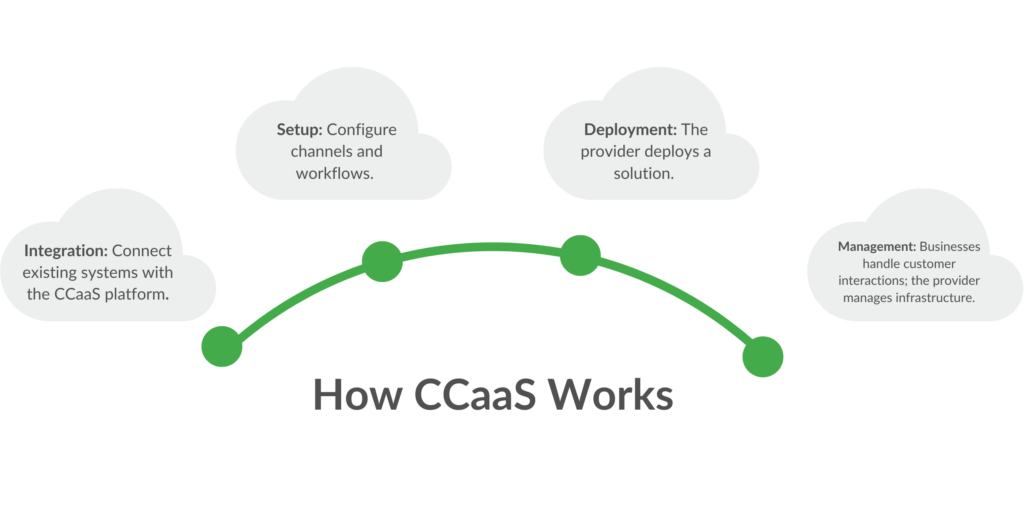What is CCaaS? – A Thorough Guide

Introduction
In today’s fast-paced business environment, staying connected with customers is crucial. Enter Contact Center as a Service (CCaaS)—a revolutionary approach to managing customer interactions. CCAAS refers to a cloud-based model where businesses use a provider’s infrastructure to handle customer communications. Unlike traditional contact centers that rely on on-premises hardware and software, CCAAS leverages cloud technology to deliver services over the internet.
The shift towards CCAAS is driven by its ability to offer unparalleled flexibility, scalability, and cost-effectiveness. As businesses grow and customer expectations evolve, CCAAS provides a modern, adaptable solution that meets these demands without the hefty upfront costs associated with traditional contact centers.
Understanding CCaaS
What does CCaaS mean?
CCaaS represents a significant departure from traditional contact center models. Instead of investing in physical infrastructure, businesses use a cloud-based platform to manage customer interactions. This model enables companies to access advanced features and technologies without maintaining the hardware and software themselves.
Traditional contact centers require substantial investments in on-premises equipment and ongoing maintenance. In contrast, CCAAS eliminates these needs by providing a subscription-based service that handles all technical aspects of customer interaction management. This allows businesses to focus on their core activities while enjoying the benefits of the latest technology.
Core Components of CCaaS
CCaaS platforms are designed with several key features to enhance customer service. Cloud-based operations ensure that businesses can scale their contact center capabilities quickly and efficiently. Multichannel support allows interactions through voice, email, chat, and social media, creating a seamless experience for customers. Integrated analytics provide valuable insights into customer behavior and agent performance, helping businesses make data-driven decisions.
How CCaaS Works
A CCaaS platform typically operates as follows:
Integration: Businesses integrate their existing systems with the CCaaS provider’s platform.
Setup: Configure communication channels and set up workflows.
Deployment: The provider deploys the solution, making it available via the cloud.
Management: The business manages customer interactions through the CCaaS interface, while the provider maintains the underlying infrastructure.
For instance, a customer reaching out via chat might be routed to the appropriate department based on their query. The interaction history is logged, and analytics are collected to improve future interactions. Similarly, AI-powered tools can provide real-time assistance and automate routine tasks, streamlining the customer experience.
Advantages of CCaaS for businesses
Scalability and Flexibility
One of the most significant advantages of CCaaS is its scalability. Businesses can easily adjust their contact center capacity based on current needs, whether expanding for seasonal demand or scaling down during quieter periods. This flexibility helps businesses manage resources efficiently and respond to changes in customer behavior.
The adaptability of CCaaS means that companies can quickly reconfigure their services to meet evolving customer expectations and market conditions. This ensures that businesses remain agile and responsive without being constrained by rigid infrastructure.
Cost Efficiency
By utilizing a cloud-based model, businesses can avoid the substantial initial investment required for traditional contact center infrastructure. Instead, they pay a subscription fee, which often includes all necessary updates and maintenance.
Many CCaaS providers offer pay-as-you-go pricing, allowing businesses to pay only for the services they use. This model helps manage costs effectively and ensures that businesses are not locked into long-term commitments or unnecessary expenses.
Enhanced Customer Experience
CCaaS platforms facilitate a unified approach to customer service by integrating multiple communication channels. This means customers can reach out through their preferred method, whether it’s via voice call, email, chat, or social media, and receive a consistent and high-quality experience.
Advanced CCaaS solutions use AI to personalize interactions and provide tailored recommendations based on customer data. AI-driven tools, such as chatbots, can handle routine inquiries, freeing up agents to focus on more complex issues.
Access to Advanced Technologies
CCaaS platforms leverage cutting-edge technologies like AI and machine learning to enhance service delivery. These technologies enable predictive analytics, automate repetitive tasks, and provide actionable insights to improve decision-making and operational efficiency.
For instance, predictive analytics can anticipate customer needs based on historical data, while AI-powered chatbots provide instant responses to common queries, ensuring customers receive timely assistance.
Improved Remote Work Capabilities
The cloud-based nature of CCaaS supports remote work by enabling agents to access the platform from any location with internet connectivity. This flexibility is increasingly important in today’s work environment, where remote and hybrid work arrangements are common.
Cloud-based platforms ensure that remote agents have access to the same tools and information as those in a physical contact center. This consistency helps maintain service quality and efficiency regardless of where employees are based.

Key Features of a Robust CCaaS Solution
Omnichannel Support
Omnichannel support is crucial for providing a seamless customer experience. A robust CCaaS solution integrates various communication channels into a single platform, allowing businesses to manage interactions from voice calls to social media messages in one place.
Analytics and Reporting
Advanced analytics and reporting features help businesses track and analyze customer interactions and agent performance. This includes monitoring metrics such as response times, resolution rates, and customer satisfaction scores, providing valuable insights to improve service quality.
Common metrics include Average Handle Time (AHT), First Call Resolution (FCR), and Customer Satisfaction (CSAT) scores. Tracking these KPIs helps businesses identify areas for improvement and optimize their contact center operations.
AI and Automation
AI plays a significant role in modern CCaaS platforms by automating repetitive tasks and enhancing overall efficiency. Features like chatbots handle routine inquiries, while AI-driven analytics provide actionable insights to refine customer service strategies.
Chatbots can manage common customer queries 24/7, while predictive analytics forecast future customer behavior and preferences, allowing businesses to proactively address needs and enhance service delivery.
Integration with Other Business Tools
A robust CCaaS solution integrates seamlessly with other business tools such as Customer Relationship Management (CRM) systems and marketing automation platforms. This integration enhances overall business operations by providing a unified view of customer interactions and streamlining workflows.
By connecting contact center operations with CRM and other systems, businesses can ensure that customer data is consistent and up-to-date, leading to more effective marketing campaigns and improved customer relationship management.
Choosing the Right CCaaS Provider
Factors to Consider
When selecting a CCaaS provider, consider factors like the reliability of their services, data security measures, scalability options, and the quality of their customer support. These elements are crucial for ensuring a smooth and secure contact center operation.
Vendor Reputation
Opting for a provider with a proven track record and positive customer feedback can significantly impact the success of your CCaaS implementation. Research vendor reputation and seek out reviews and case studies to gauge their reliability and effectiveness.
Customization and Flexibility
A good CCaaS solution should offer customization options to meet your specific business needs. This flexibility allows you to tailor the platform to your operational requirements, ensuring it aligns with your unique customer service goals.
Compliance and Data Security
Compliance with industry regulations and standards is essential for protecting customer data and maintaining trust. Verify that the CCaaS provider adheres to relevant data protection laws and offers robust security measures to safeguard sensitive information.
Conclusion
Summary of Key Points
CCaaS represents a modern, flexible approach to managing customer interactions, offering numerous benefits such as scalability, cost efficiency, and access to advanced technologies. By leveraging a cloud-based model, businesses can enhance customer experiences, support remote work, and streamline operations.
To explore how CCaaS can transform your customer service operations, contact us for a discovery call so we can learn about your business’s needs. Discover firsthand how this innovative solution can drive your business forward and meet the evolving needs of your customers.
Explore more on:





